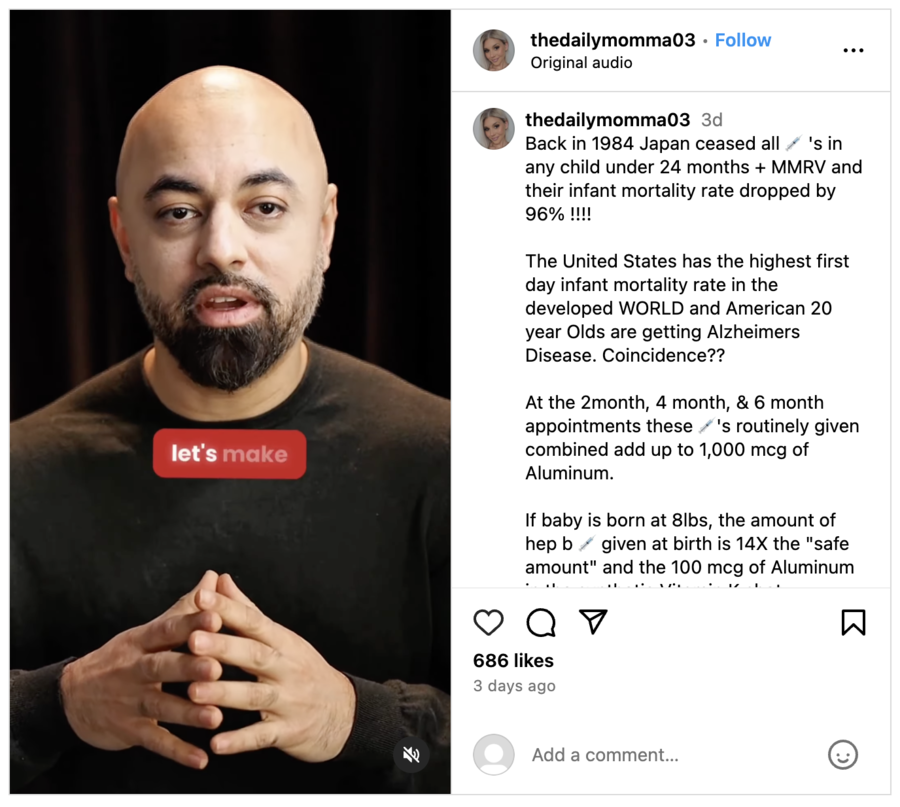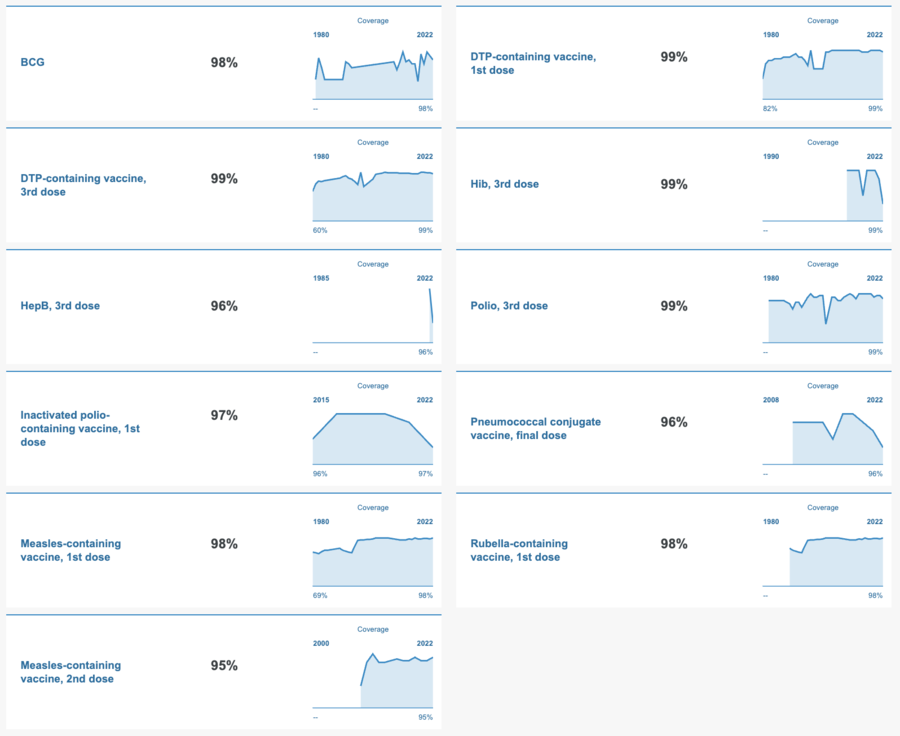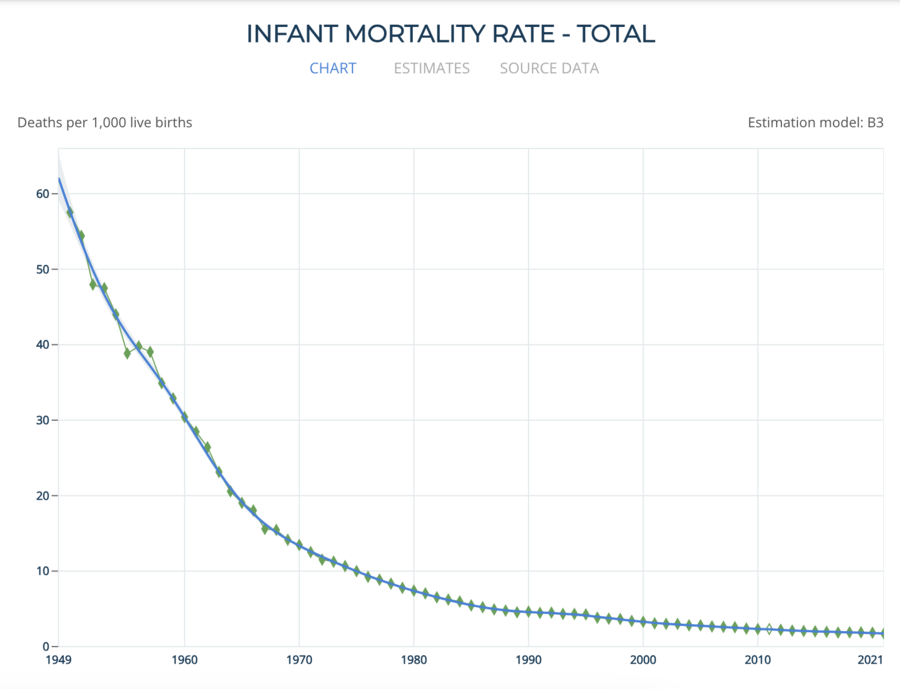
Did a drop in vaccine uptake in Japan cause a drastic drop in infant mortality, as a post on Instagram suggested? No, that's not true: While there was a policy change in 1994 that removed government requirements for childhood vaccines, Japanese health authorities and experts still recommend a routine vaccine schedule similar to those implemented in the U.S. Japan has one of the highest rates of vaccination in the world. Its decline in infant mortality rate is attributable to many factors, including increased access to immunizations, improvements to neonatal care and an investment in medical infrastructure and understanding, an infectious disease expert told Lead Stories.
A version of the claim appeared in a video on Instagram on February 11, 2024 (archived here), posted by @thedailymomma03 with a caption that read, in part:
Back in 1984 Japan ceased all 💉 's in any child under 24 months + MMRV and their infant mortality rate dropped by 96% !!!!
Below is how the post appeared at the time of writing:
(Source:
Implied in the video is the claim that after Japan eliminated mandatory vaccines, the infant mortality rate decreased.
Lead Stories found, using a reverse image search (archived here) of a screenshot from the above video via Yandex, that the speaker in the video is Kashif Kahn, who describes himself on his Instagram profile as a "Celebrity Longevity Expert." Khan is also the "CEO & Founder" of The DNA Company (archived here), which sells DNA kits for $499 (archived here). Kahn originally posted the above video to Instagram on February 11, 2024 (archived here).
Vaccines no longer mandated but still recommended by Japanese health officials
Japan's Immunization Act (archived here), enacted on June 30, 1948, initially required citizens to receive vaccinations that were "known to be effective for the prevention of a particular disease as it affected immunity against that disease," including diphtheria, pertussis, polio, measles and rubella, among others.
In response to concerns over adverse reactions associated with a one-size-fits-all policy, health officials in 1994 amended the Immunization Act to recommend, not require, vaccinations so that patients and their providers could make informed decisions on a case-by-case basis, according to a 2023 analysis published in the journal Vaccine (archived here).
The 1994 amendment changed vaccination from a "compulsory basis to an informed-consent basis" and eased the level of citizen obligation from "the duty of every citizen" to "make an effort to be immunized," according to a 2002 analysis published in the Journal of Infectious Disease (archived here).
Japanese law on vaccines further specifies that all citizens "must endeavour to undergo a routine vaccination" against "category A diseases," which include highly infectious diseases like measles, mumps and rubella. Following the 1994 law revision, vaccination rates continue to remain high, according to the Japanese Ministry of Health, Labour and Welfare (archived here).
Japan remains one of the most highly vaccinated countries in the world
As of this writing, Japan's Ministry of Health, Labour and Welfare (archived here) and the Japan Pediatric Society (archived here) both endorse (archived here) routine vaccines (archive here) in a similar schedule as the U.S. (archive here). Data published (archived here) by the World Health Organization (WHO) further shows that the western Pacific nation has one of the highest immunization rates in the world (archived here).
According to the most recently available estimates by WHO and UNICEF analyzing immunization coverage, published July 1, 2023, (archived here), vaccination coverage has remained roughly the same between 2011 and 2022 for vaccines that were available, with more than 90 percent of the population estimated to have been immunized against most recommended vaccines for the decade.
Though vaccination rates have been high, it is important to note that the 1994 amendment resulted in what's known as the "vaccine gap," which resulted in a shortage of voluntary vaccine administrations throughout the 2010s, according to a 2012 study published in the journal Vaccine (archived here):
The current national immunization program (NIP) which was established under the Japanese Immunization Law includes only six vaccines (eight targeted diseases), and the rest of available vaccines have been categorized as voluntary vaccines, which require out-of-pocket expense in order for the patients to receive them. This has led the vaccination rates for the voluntary vaccines remaining low, and the incidence of the target diseases remaining high.
However, targeted public health measures meant to combat the gap have proved that this lag in vaccination rates was short-lived. Take, for example, the below WHO vaccination data (archived here):
(Source: WHO screenshot taken Thu Feb 15 at 17:35:2024)
Infant mortality rates declined due to variety of reasons, including advancements in health care
Infant mortality is defined (archived here) by WHO as the "probability of a child born in a specific year or period dying before reaching the age of one." Infant mortality rates in Japan have steadily declined since the 1950s -- more than four decades before the 1994 policy change -- in large part due to advances in public health measures and scientific understanding.
In a phone interview on February 14, 2024, Dr. William Schaffner (archived here), a professor of infectious diseases at Vanderbilt University Medical Center (archived here), told Lead Stories that the decline in infant mortality rates can be attributed to many factors. Schaffner continued:
There is a lot more that we know about prenatal care of the mother and care for the infant that are born prematurely. We have developed and elaborated on neonatal intensive care units and part of this has happened worldwide, but Japan has a very organized society.
The decline began before the change in vaccine schedules and has continued. So you can't attribute that to the change in vaccine schedules. Even though the requirement [to vaccinate] has been dropped, compliance remains very high. ...
There are two things that happened at the same time but they are not causally related. Here, many things are happening over time that influence infant mortality, nonetheless, vaccination has remained very, very high in Japan. So has acceptance of vaccines, both on an individual basis and for societal conformance.
In 1950, there were an estimated 57.71 infant deaths per 1,000 live births in Japan. In 1994, that number had declined to 4.25 deaths, and in 2021, again decreased to 1.74 deaths, according to data published by the United Nations Interagency Group for Child Mortality Estimation (archived here):
(Source: IGME screenshot taken Thu Feb 15 17:37:38 2024 UTC)
Read more
Additional Lead Stories fact checks of claims about vaccines can be found here.





















